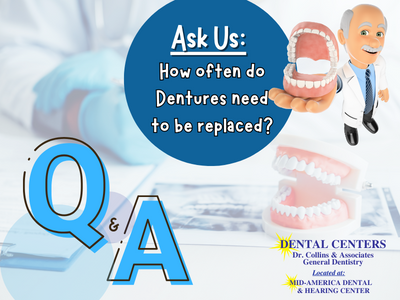Our Dental Blog

How Long Do Dentures Last
Have you asked yourself “How long do dentures last?” If so, it is important to note that there is no firm timeline or expiry date as it truly depends on several different factors. Denture problems can crop up at any time and may not necessarily be obvious at first glance, which makes estimating how long dentures last difficult to estimate.
Dentures are fragile appliances that get handled frequently, increasing the chance of being dropped, which may damage them prematurely. Simple accidents or slight damage can easily result in denture replacement. For individuals who lead active lives, false teeth can be damaged through physical activity such as contact sports, even if you are wearing a mouth guard as protection. Plus, any other trauma to the mouth or jaw, such as from an automobile accident or traumatic falls, can break or crack false teeth. In addition to that, natural changes to your jaw can mean that your dentures do not fit as they once did. While this may make dentures sound like a lot of work, they will generally last a long time if taken care of properly.
To help answer the question, we have provided a shortlist of some of the signs to watch for that will signal to you that denture replacement should be something you are planning for soon.
SIGN #1 – YOUR DENTURES DON’T FIT PROPERLY ANYMORE
The thing about false teeth that makes them effective is the fit. They are designed to fit inside your mouth and remain in there snuggly. This is why dentures are custom-made for each patient. No two mouths have the same jawlines, and your dentures will not fit someone else. The perfect fit is essential as it helps you to smile, speak, and eat properly.
With dentures that have become loose, you risk them shifting within your mouth at the worst possible time. Loose dentures may also be the result of a gradual change in your gum line. You may not have to replace your false teeth. They may only require a denture reline to improve the fit.
Loose dentures are not ideal for many reasons, so contact your dentist as soon as this problem develops.
SIGN #2 – YOUR DENTURES HURT TO WEAR
Denture pain is sometimes “expected”, but it can also be a bad thing. It is to be expected to a certain extent when you experience it during the early phase of wearing false teeth. This type of denture pain is an indication that your mouth, gums, cheeks, and jaw muscles are getting accustomed to the foreign object you are wearing. This type of discomfort disappears over time and quits being a problem as you get used to your dentures.
However, denture pain is bad when it develops as a result of something that isn’t quite right with your dentures. Broken, warped, and even poorly fitted false teeth can create irritations in the mouth. These can become sores that will make your mouth and tongue sensitive, and the pain will make you want to stop wearing your dentures.
SIGN #3 – YOUR DENTURES ARE SHOWING THEIR AGE
Old dentures are those that no longer fit right and have some scratches, dents, and other signs of wear and tear. Maybe the teeth that are part of your dentures are not looking as good as they once did and are a bit worn down. This can happen over time. Plus, the plates that hold these teeth should also appear in good working order.
If you have not been taking good care of your dentures by cleaning them regularly, they can start to look like they are not in the best of shape. Forgetting to soak them overnight will cause false teeth to dry out and this can lead to structural damage, or they may become brittle and teeth may break off or the entire denture may suffer a break or crack. You can help to avoid this by spending a little extra time looking after your dentures which can help to make them last a lot longer.
SIGN #4 – YOUR DENTURES ARE JUST NOT ATTRACTIVE ANYMORE
Another problem that can develop with dentures from lack of care is they will become stained and weakened. Discolored dentures are not very attractive and can affect your self-confidence. This is why it is so important to follow proper care and maintenance of false teeth. Failure to do so will speed up the aging of these appliances to where they will require denture replacement far earlier than normal.
The material false teeth are made from does break down over time. Deep scratches can create a weak spot where the dentures can crack or break. To catch this before it becomes a problem, take the time to inspect your dentures each day. Observe the color of the plates and teeth. Make a note of the condition of both.
So, how long do dentures last? To some extent, this depends on how well you continue to take care of them. That can be several years provided your mouth, gums, and jawline do not change much over the years. However, if you don’t take proper care of your dentures, or if you are in an accident or cause other damage to your dentures, their lifespan may be much shorter.
If you are having some denture problems and you are not sure if it is time to consider denture replacement give us a call today (417) 466-7196 to schedule an appointment.
Blog Archive

